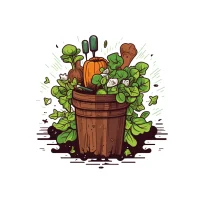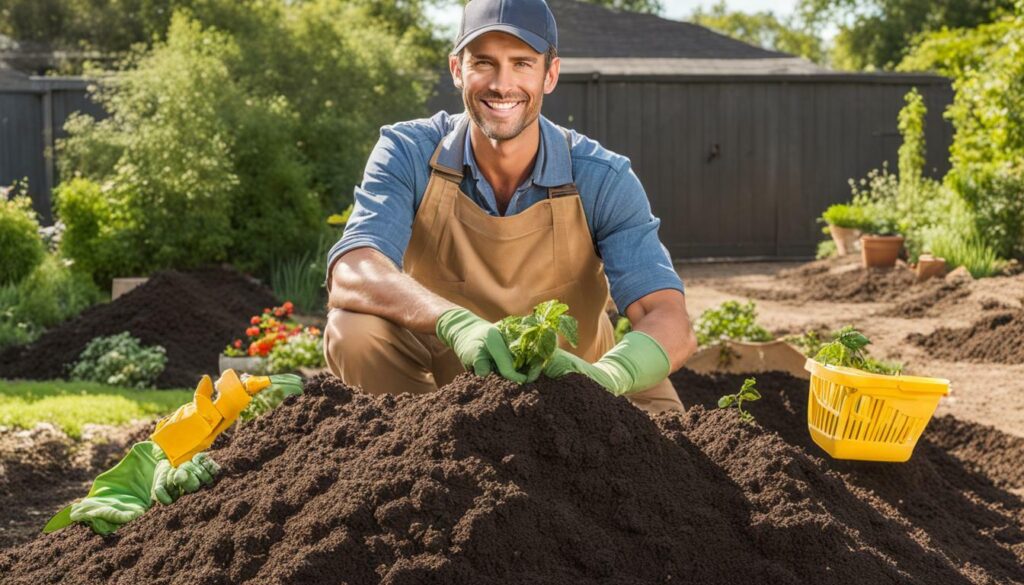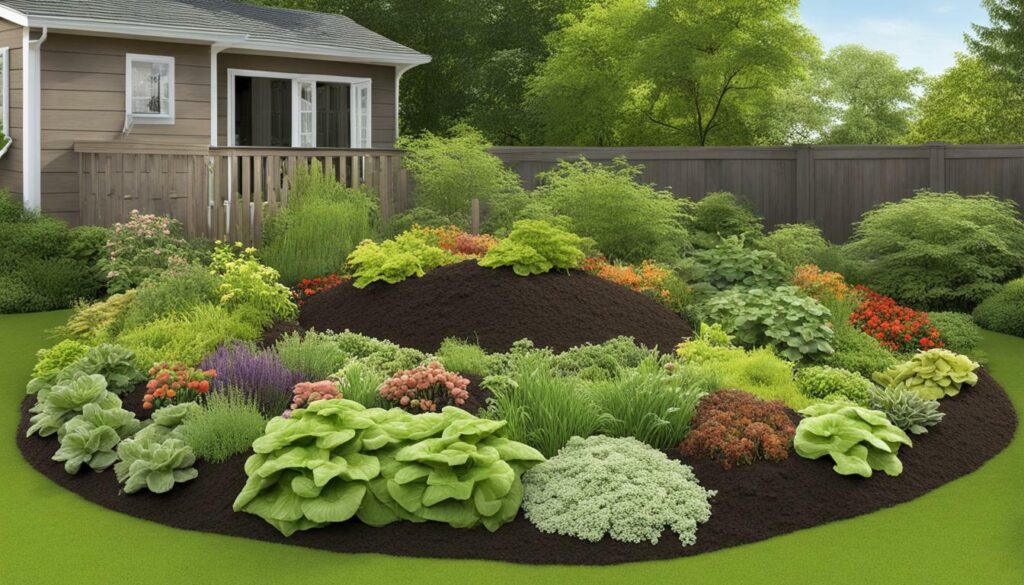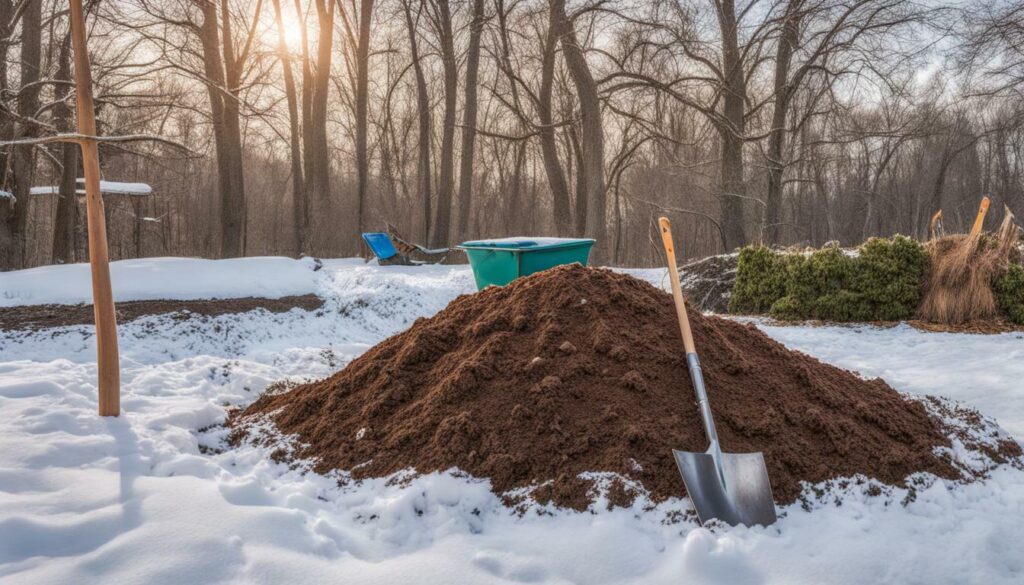Composting is an excellent way of creating nutrient-rich soil while being environmentally friendly. To ensure that your composting process goes smoothly, there are certain things you need to do. One of the things that some people consider is using a compost starter. A compost starter is a product added to the compost pile to enhance the process.
In this guide, we will explore the benefits of using compost starter, potential drawbacks, alternative options, and how to use compost starter effectively.
Key Takeaways
- Compost starter can speed up the composting process by providing essential microorganisms to the pile.
- Using compost starter can improve the quality of the finished compost.
- It is important to consider the type of compost starter and how it fits into your composting routine.
Understanding Compost Starter
Compost starter is a product that helps to speed up and enhance the composting process. It is typically made up of a blend of organic materials, including composting ingredients such as nitrogen, carbon, and microorganisms. Compost starter is also known as compost accelerator, compost activator, or compost inoculant.
The addition of compost starter to a compost pile provides the necessary microorganisms that aid in the decomposition of organic matter. This process breaks down materials into nutrient-rich soil that can be used in organic gardening.
There are different types of compost starter products available on the market. Some contain beneficial bacteria and fungi that promote decomposition, while others have a blend of minerals to boost nutrient content. It is important to choose a compost starter that aligns with the specific needs of the compost pile.
Benefits of Using Compost Starter
Compost starter can greatly enhance the composting process, providing a range of benefits for your garden and the environment. Here are a few key benefits that may make it worth adding compost starter to your pile:
- Accelerated decomposition: Compost starter contains microorganisms that break down organic matter more quickly than naturally occurring microorganisms. This speeds up the composting process, allowing you to obtain nutrient-rich compost in shorter timeframes.
- Improved nutrient balance: Compost starter can boost the nutrient content of your compost by adding beneficial bacteria and fungi. These microorganisms play important roles in the breakdown of organic matter and can help improve the nutrient balance of the final compost product.
- Reduced odors: Compost starter can help reduce the unpleasant odors that can sometimes accompany composting. This is because the microorganisms in compost starter break down organic matter more efficiently, reducing the likelihood of anaerobic conditions that lead to bad odors.
- Increased pest resistance: Adding compost starter to your pile can help increase the pest resistance of your plants. This is because compost starter can promote the growth of beneficial microorganisms that help protect plants against harmful pests and diseases.
Overall, adding compost starter to your pile can be a great way to enhance the composting process and produce high-quality compost for your garden. However, it’s important to consider the potential drawbacks and factors that may affect your decision to use compost starter.
Potential Drawbacks of Using Compost Starter
While compost starter can be a helpful addition to your composting process, it is important to be aware of the potential drawbacks.
Composting Techniques
Firstly, it’s important to note that compost starter is not a substitute for good composting techniques. Adding compost starter to a poorly maintained compost pile will not magically turn it into nutrient-rich compost. It is important to follow proper composting techniques including layering materials, turning the pile regularly, and keeping it moist.
Compost Accelerators
Additionally, some compost starter products may contain accelerators that can speed up the composting process. While this may sound like a positive attribute, the faster the pile breaks down, the less time it has to develop important nutrients. This can result in a lower quality compost that is less beneficial for your garden.
It is also important to consider the environmental impact of using compost accelerators. They may contain chemicals that can negatively impact the soil and nearby ecosystems.
Therefore, it is crucial to choose a compost starter that is made from organic and natural ingredients, ensuring that it is both safe for your garden and the environment.
Factors to Consider
Before deciding whether or not to add compost starter to your pile, there are a few factors to consider. First and foremost, it’s important to take into account the nature of your organic waste. If your pile consists mainly of kitchen scraps or yard waste, you might not need to add compost starter. However, if you’re looking to compost a wider variety of materials, such as meat or dairy products, adding a compost starter can be beneficial.
Another important factor is the size of your pile. If you have a large pile, you may want to consider adding compost starter to speed up the composting process. However, if you have a smaller pile, compost starter may not be necessary.
Finally, it’s essential to consider your goals when composting. If you’re composting simply to reduce waste, you might not need to add compost starter at all. However, if you’re composting for use in organic gardening, using a compost starter can help improve the quality of your compost and, in turn, improve the health of your plants.
Composting Tips for Organic Gardening
- Use compost as a natural fertilizer for your organic garden.
- Avoid adding any materials that have been treated with pesticides or herbicides.
- Make sure your compost pile is well aerated and moist to encourage the growth of beneficial microorganisms.
- To speed up the composting process, turn your pile regularly to ensure even decomposition.
- Be patient – composting takes time, but it yields great results for your organic garden.
Alternatives to Compost Starter
While compost starter can certainly speed up the composting process and provide other benefits, it’s not the only solution for composting success. There are several natural alternatives to consider, depending on what you have available and what your goals are.
Composting Ingredients
One effective alternative to compost starter is to use high-nitrogen materials, such as fresh grass clippings or manure, as a natural activator for your compost pile. These ingredients help to kick-start the composting process by introducing beneficial microorganisms and feeding the helpful bacteria already present in your pile.
Additionally, adding chopped-up vegetable scraps and fruit peels can provide a boost of nutrients and encourage the breakdown of other materials in your compost pile.
Composting Techniques
Another alternative to compost starter is to use composting techniques that naturally speed up the process without the use of additives. For example, turning your compost pile regularly or adding materials in layers can help to aerate the pile and create the ideal environment for rapid decomposition.
Adding moisture and keeping the pile warm can also speed up the composting process, while using a compost bin or tumbler can help to contain the pile and reduce odors.
Ultimately, the best approach for your compost pile may involve a combination of these techniques and ingredients, as well as regular monitoring and adjustments to ensure optimal results.
Step-by-Step Guide to Adding Compost Starter
Once you have decided to add compost starter to your pile, it’s important to follow a few simple steps to ensure its effectiveness. Here is a step-by-step guide:
- Choose the right compost starter product for your needs. Consider things like ingredients, price, and availability.
- Add the compost starter to your pile according to the manufacturer’s instructions. Generally, you will want to sprinkle it evenly over the top of your compost pile.
- Use a garden fork to mix the compost starter into the top layer of your pile. This ensures that it is evenly distributed and starts working quickly.
- Water your pile thoroughly after adding the compost starter. This helps to activate the microbes and other beneficial organisms in the starter.
- Cover your pile with a tarp or other material to help retain moisture and heat. This will also help to keep out any unwanted pests or rodents.
- Monitor your compost pile regularly to ensure that it stays moist and aerated. Turn the pile every few weeks to help circulate air and speed up the composting process.
- After several weeks or months (depending on the size of your pile and the materials used), your compost should be ready to use in your garden or landscaping projects!
Following these steps will help you get the most out of your compost starter and ensure that you have a healthy, thriving compost pile. By taking the time to properly add compost starter, you can enjoy all the benefits of composting and organic gardening.
Common Compost Starter Products
Compost starter is typically sold in a dry, granular form and is made up of a combination of composting ingredients that serve as compost activators. There are many different types of compost starter products available on the market today, each with their own unique blend of ingredients. Some of the most common compost starter products include:
| Product Name | Ingredients |
|---|---|
| Nature’s Care Organic and Natural Compost Accelerator | Bone meal, soybean meal, and dried molasses |
| Dr. Earth Compost Starter | Alfalfa meal, fishbone meal, and montmorillonite clay |
| Jobe’s Organics Compost Starter | Feather meal, bone meal, and sulfate of potash |
Aside from commercially available compost starter products, you can also make your own compost activators using kitchen scraps such as banana peels, coffee grounds, and eggshells. These organic composting ingredients are high in nitrogen and other beneficial nutrients that help to speed up the composting process.
When choosing a compost starter product, it’s important to carefully read the label and select one that is specifically designed for the type of composting you plan to do. Some compost starter products are designed for use with kitchen scraps and other organic materials, while others are better suited for larger-scale composting operations.
Tips for Using Compost Starter Effectively
Adding compost starter to your pile can speed up the composting process and provide numerous benefits. However, to ensure you get the best results, it’s essential to use it correctly. Here are some tips to help you use compost accelerators effectively:
Avoid Overusing
While compost starter can be beneficial, it’s important not to overuse it. Too much compost accelerator can create an imbalance in your pile, leading to unpleasant odors and slowed decomposition. Follow the manufacturer’s instructions or use one cup of starter per cubic yard of material.
Mix Thoroughly
When adding compost starter, make sure to mix it thoroughly into your pile. This will ensure that it’s evenly distributed, and every part of your compost will benefit from it. Use a garden fork or shovel to turn and mix your pile, making sure to incorporate the compost accelerator into the lower and middle sections.
Adequate Moisture
Compost starter works best when your pile has the correct moisture level. If your pile is too dry, the microorganisms that break down your compost will become inactive. On the other hand, if your pile is too wet, it won’t get enough oxygen, leading to slow decomposition and unpleasant smells. Maintain your pile’s moisture level by adding water or dry materials as needed.
Monitor Temperature
Your compost pile’s temperature is a critical indicator of its health. When using compost accelerator, temperature monitoring becomes even more important, as it can help you assess whether your pile is too hot or cold. Make sure your pile maintains a temperature between 120 and 160 degrees Fahrenheit. If your pile becomes too hot, it can kill beneficial bacteria. On the other hand, if it’s too cold, decomposition will slow down.
Use High-Quality Materials
Compost starter can’t work miracles if you’re using poor quality materials. Make sure to use high-quality organic matter, such as vegetable scraps, grass clippings, and leaves. Avoid using meat, bones, and dairy products, as they can attract pests and slow down the decomposition process.
By following these tips, you can ensure that you use compost starter effectively and get the most out of your composting efforts.
Case Studies and Success Stories
Many organic gardeners and compost enthusiasts have reported positive results from using compost starter. By enhancing the composting process, compost starter benefits can include faster decomposition, increased microbial activity, and better nutrient retention.
In one case study, a gardener compared two compost piles side by side. One pile used compost starter, while the other did not. The pile with compost starter broke down faster and had a higher nutrient content than the pile without. The gardener was able to use the compost in his garden sooner and with greater success.
Another success story comes from a community garden using compost starter to improve their soil quality. The garden had been struggling with poor soil, but after using compost starter in their composting process, the soil quality improved dramatically. They were able to grow healthier plants and produce more bountiful harvests.
These success stories show that using compost starter can be a valuable tool for enhancing the composting process and improving soil quality. However, it is important to note that results may vary and there are other factors to consider in successful composting.
Conclusion
When considering whether to add compost starter to your pile, it’s important to weigh the benefits and potential drawbacks. While compost starter can enhance the composting process and increase the speed of decomposition, it’s important to use it properly to avoid negative effects on your soil and compost quality.
If you decide to use compost starter, be sure to choose a high-quality product and follow the manufacturer’s instructions carefully. Consider your composting goals and the specific ingredients in your pile when deciding whether to use a starter. And if you’re not sure whether compost starter is the right choice for you, there are plenty of other organic ingredients and techniques you can use to enhance your composting process.
Should I add compost starter to my pile?
The answer ultimately depends on your goals, your compost ingredients, and your composting techniques. Consider the benefits and drawbacks of using compost starter before making a decision, and always use it responsibly to ensure the best results for your soil and garden.



